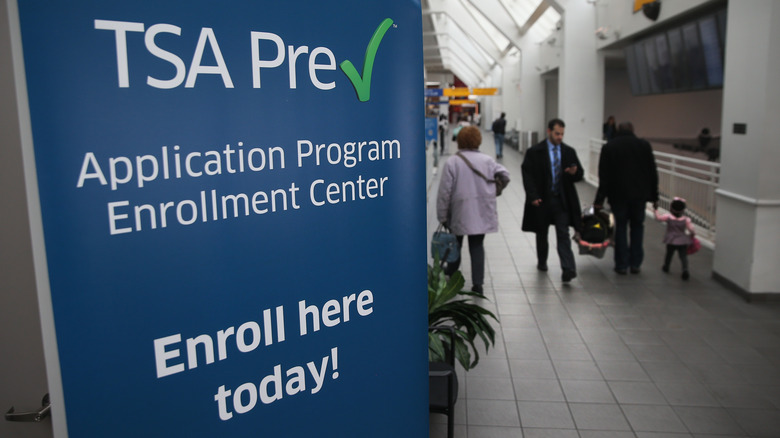Requirements You Need To Know Before Applying For TSA PreCheck
Airport security lines can be long and torturous, but TSA PreCheck is here to speed up the process. With the program, you can expect shorter lines and you don't have to remove your shoes and personal items from your bags. However, there are several requirements to get approved for TSA PreCheck.
One of the most basic requirements is that you must be a U.S. citizen, national, or lawful permanent resident. If you don't fall into one of these groups, you may be approved for another program instead, such as Global Entry. You'll also need to provide a valid U.S. passport (make sure to renew your passport if it's set to expire soon!), a permanent resident card, or a similar form of identification that includes a photo and confirms your citizenship or naturalization.
To complete your application, take your required documents to an enrollment location, where you'll provide fingerprints and pay any fees. The in-person visit also involves a short interview, where you'll likely be asked a few questions about your identity and background. The process may seem stressful, but as long as you arrive prepared, it's usually quick and straightforward.
You may be rejected if you have a criminal background
TSA PreCheck allows less stringent security measures when going through the airport's TSA checkpoints. As a result, you must demonstrate that you're a law-abiding citizen or resident to be approved. TSA will check your criminal record, and, if the agency finds certain offenses in your history, it may reject your application.
Specifically, TSA looks for a history of violence or crimes that could put a flight at risk. In some cases, this can include offenses that are considered misdemeanors. For example, you can be permanently barred from joining the TSA PreCheck program if you've been convicted of murder, espionage, sedition, treason, crimes of terrorism, falsifying information, and other crimes involving security threats or possession of dangerous materials. If you were convicted of attempting these acts, you may also be rejected, even if the crime wasn't successfully carried out.
You can also be temporarily rejected — typically up to seven years — for certain criminal offenses. These include unlawful possession of a firearm, fraud, bribery, aggravated assault, robbery, and immigration violations, among other crimes. Additionally, any pending warrants or indictments will also disqualify you from TSA PreCheck until cleared.
You must be considered mentally sound
Respecting the law and staying out of trouble are the most important requirements involved when signing up for TSA PreCheck. However, it's important not to overlook another vital condition: mental soundness. Mental health can be a sensitive subject, and most people who have struggled with mental health symptoms will pose no threat to others on a plane or at an airport. With that said, TSA states on its website that an applicant will be rejected if a "court, board, commission, or other government authority" has determined that they pose a danger to themselves or others due to mental illness or that a mental health condition limits their ability to stand trial or manage personal affairs. The security agency also notes that an involuntary admission to an inpatient facility "for mental health or psychiatric reasons" is also grounds for disqualification.
If you're worried these conditions may disqualify you, there are a couple of ways around them. First, you have the right to appeal a TSA PreCheck rejection and provide more information about your mental health history. Additionally, you may not actually meet the conditions for disqualification if, for instance, your admittance to a mental health facility was unrelated to a crime or court order. When in doubt, answer the application questions as honestly and accurately as you can and explain your situation in more detail during your interview.


